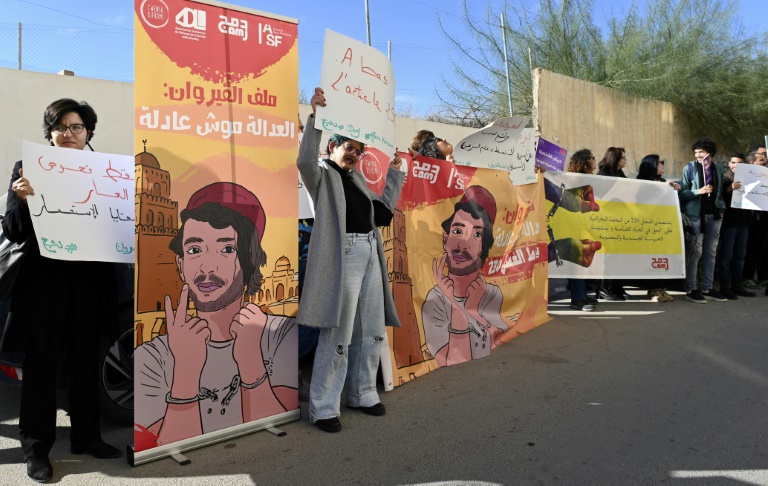Some protestors held placards reading "Down with the Article of shame", referring to Article 230 of Tunisia's penal code which punishes consensual homosexual acts, whether between men or women, with up to three years in prison.
A Tunisian man appeared in court Monday in the latest hearing in a long-running case that could see him returned to prison for more than two years for homosexuality.
Rights activists protested outside the appeals court in the central city of Kairouan, as the man known only as “Daniel” appeared before judges on the first day of the hearing.
Daniel, along with five other men, was originally charged in 2015 with “homosexual acts”, which is punishable by up to three years in prison in the North African nation.
Later that year, they were each sentenced to the full three years in prison, and banned from living in Kairouan province for a further three years.
They appealed the verdict, and in 2016 had their sentences reduced to 40 days in prison.
But in 2018 Tunisia’s Court of Cassation, the country’s top court, sent the case back for another appeal on technical grounds.
By that time, five of the men had fled abroad and found asylum, but Daniel remained in Tunisia and must now face court again.
Daniel, speaking Monday after the hearing, said it had been “okay” and that he “was able to speak to the judge comfortably”.
Around 30 protestors gathered outside the court, including representatives from local rights groups Damj and the Tunisian Human Rights League.
Damj member Seif Ayadi said that the protest had been primarily to defend Daniel, but also to “demand justice for all the victims, even if it’s symbolic”.
Some of the slogans included “Queer revolution against the patriarchy”, and “My personal freedom is not the property of the Tunisian state”.
Protestors also held placards reading “Down with the Article of shame”, referring to Article 230 of Tunisia’s penal code which punishes consensual homosexual acts with up to three years in prison.
Article 230 allows the state to conduct anal tests on suspects, a practice harshly criticised by rights groups including the United Nations Committee Against Torture.
The article also outlaws setting up associations to defend LGBTQ rights.
In 2018, Tunisia increased the sentencing of homosexuals, with 127 jail terms imposed.
In December 2021, Damj estimated some 150 people were being held in Tunisia’s prisons for homosexuality.











